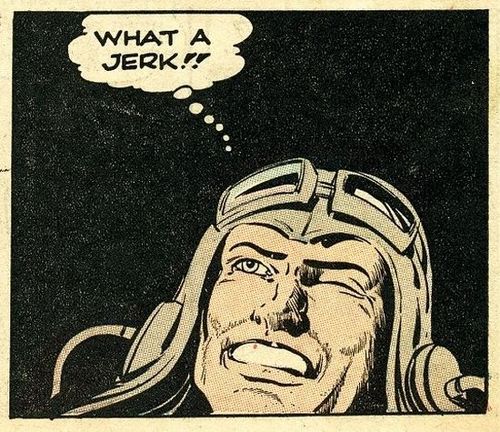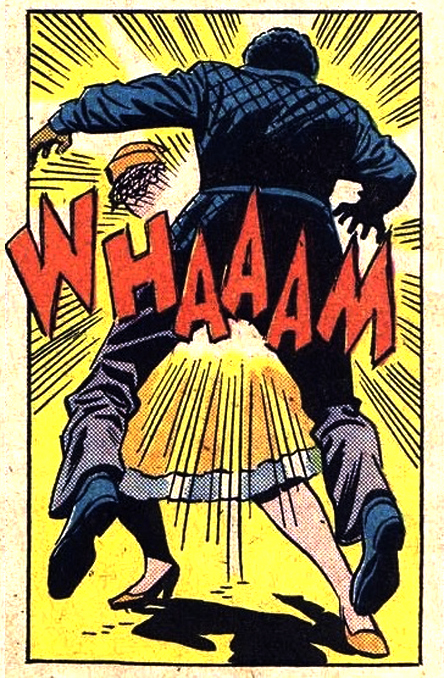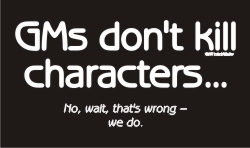Somewhere*, sometime**, D was talking about writing things and said something like:
The only scene in a story with no conflict in it should be the epilogue at the end of the story.
I know that isn’t it exactly, but that’s the gist of it; when you’re telling a story, scenes should have conflicts in them, or they shouldn’t… you know… be scenes.
De also pointed out*** that you can cheat this a little bit in a scene without any obvious conflict by then revealing “Yeah, while it looked like Mom and Daughter were have a nice happy cup of tea for six pages, Mom had ACTUALLY CALLED THE INSANE ASYLUM TO TURN IN HER DAUGHTER!” DUN Dun dunnnn.
A good trick (one which I’ve used), but it doesn’t change the basic idea, which is (put into my own words):
Never stop fucking with the main character.
Yeah, yeah, “show, don’t tell” works, because if you are legitimately trying to “show” as you write a scene you’ll instinctively put in some kind of thing worth showing. A conflict. There you go. You’ve done it.
(Tangential thought I just had: This may be be a legitimate means of separating “porn” from “erotica”. Erotic has sex scenes with conflict. Porn just has scenes with people fucking. Maybe? Hmm.)
Now, none of this is particular epic storytelling trickery; people get this. People mention this kind of thing all the time.
What people are only slowly starting to get is how it applies to roleplaying games.
Let me tell you about this guy I know. Plays in my Wednesday game. Like most of the people who come in and out of the Wednesday game, he’s also runs games. As a person-who-runs-games, he has a bit of a reputation. A Nom-de-GM, even: people call him Weeda the Evil.
He’s earned this title and the attendant rep via a pretty simple means and method – he rakes his player’s characters over the coals. I’m pretty sure he used to give out certificates to anyone who died in a game he was running. There may have even been t-shirts.
He is, without a doubt, one of the most popular GMs in the Denver area. Probably, if you’re a gamer (or a reader, or an author) I don’t need to explain why.
…*crickets*…
BUT JUST IN CASE I DO, it goes something like this: no one ever gets the feeling from this guy that he’s screwing with you just to screw with you — he’s screwing with you because you’re the Big Cheese, the Main Character, the Hero. He believes you can take it, and he’ll Test to Destruction to prove his point.
He has a similar rule to the one I blocked up above. It is (not surprisingly) more concise.
Heroes Suffer.

Yeah.
The thing with RPGs is that, for a really really long time, the only tool that GMs had at their disposal was their own sense of drama and their desire to make sure the Hero Suffers. Take another guy without that sense and you have a lot of dead, boring fights. Take a different guy who only gets that you’re screwing with the characters, and not where that motivation comes from, and you just have some dick GM that everyone hates playing with.
(Take a writer who misinterprets this sort of guideline, or misreads what it is about one of their successful stories that makes people happy, and you get someone who thinks “the key to a successful story is doing horrible shit to my main character”, which somewhat misses the difference between ‘introducing conflict’ and ‘torture’. I’m looking at you, Vorkosigan series!)

Luckily, there’s a lot of great games out there that are figuring this out and helping GMs find that sweet spot between “I want to be fair and impartial” and “I need to put you through the wringer or you’re going to be bored.” It started in the good old days with GURPS and Champions and their Dependent NPC (8), but that sort of thing never really worked they way it should. Sorcerer figured it out and introduced “bangs” that pretty much made all of the GMs prep a process of building a list of tough questions the players had to answer. That was good. Primetime Adventures actually breaks if you don’t throw tough conflicts at the main characters and get the Fan Mail flowing.
And it’s gotten better. Fate/Spirit of the Century has the whole Fate Point/Aspect compels that give you a great Devil’s Deal kind of thing to use, but for my money, the best stuff out there right now that does this is Mouse Guard and Danger Patrol. I won’t get into they “whys” of this right now, because this is not the gaming blog, but MG pretty much builds an entire game around “Heroes Suffer”, and Danger Patrol is built around the idea that the only way you can help your fellow players out is by making the situation they’re in more and more Dangerous (potentially creating new dangers everyone has to deal with).
GM: “Okay, Tim is going to jump from one flying car to the other. That’s super dangerous, and worth some extra dice, but what other dangers are out there he doesn’t know about?”
Kate: “There’s a school bus coming the other way, and he’s going to force it to swerve into oncoming traffic.”
GM: “Okay… bonus dice.”
Chris: “And it’s full of kids.”
GM: “Another bonus die.”
Tim: “Umm…”
Kate: “And puppies! It’s ‘bring your puppy to school day!”
GM: “Bonus dice!”
Tim: *Groans*
NOTE: This conversation actually happened in a Danger Patrol game, just not mine – it was Brennan! (Thank you Brennan for helping me find that lost bit of info.

For the longest time, I had to remember to bring what I knew about conflicts from writing, and try to apply that to games I ran.
Now? I borrow tricks from the games I play and use them when I’m writing.
* – On her blog.
** – I couldn’t find the post.
*** – I couldn’t find this post, either.


